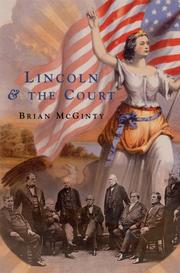| Listing 1 - 7 of 7 |
Sort by
|

ISBN: 0674040821 9780674040823 9780674032422 067403242X 9780674026551 0674026551 Year: 2008 Publisher: Cambridge, Mass. : Harvard University Press,
Abstract | Keywords | Export | Availability | Bookmark
 Loading...
Loading...Choose an application
- Reference Manager
- EndNote
- RefWorks (Direct export to RefWorks)
In a meticulously researched and engagingly written narrative, McGinty rescues the story of Abraham Lincoln and the Supreme Court from long and undeserved neglect, recounting the compelling history of the Civil War president's relations with the nation's highest tribunal and the role it played in resolving the agonizing issues raised by the conflict.
Constitutional history --- Advice and Rights. --- Law - U.S. - General --- Law - U.S. --- Law, Politics & Government --- Lincoln, Abraham, --- Linkŭln, Abrakham, --- Linkolʹn, Avraam, --- Linkūln, Ibrāhīm, --- Linkan, ʼAbrehām, --- Lincoln, A. --- Lin-kʻen, --- Linken, --- Lin, Kʻen, --- Lingkʻŏn, --- Lincoln, Abe, --- Liṅkan, Ēbrāhaṃ, --- Liṅkan, Abrahāṃ, --- לינקאלין, --- לינקאלן, אייברעהעם, --- לינקולן, אברהם --- 林肯, --- Liṅkana, Ābrāhama, --- United States. --- Supreme Court (U.S.) --- Chief Justice of the United States --- Supreme Court of the United States --- 美國. --- History.
Book
ISBN: 0674054229 9780674054226 9780674035171 0674035178 Year: 2009 Publisher: Cambridge, Mass. : Harvard University Press,
Abstract | Keywords | Export | Availability | Bookmark
 Loading...
Loading...Choose an application
- Reference Manager
- EndNote
- RefWorks (Direct export to RefWorks)
Mixing idealism with violence, abolitionist John Brown cut a wide swath across the United States before winding up in Virginia, where he led an attack on the U.S. armory and arsenal at Harpers Ferry. Supported by a "provisional army" of 21 men, Brown hoped to rouse the slaves in Virginia to rebellion. But he was quickly captured and, after a short but stormy trial, hanged on December 2, 1859. Brian McGinty provides the first comprehensive account of the trial, which raised important questions about jurisdiction, judicial fairness, and the nature of treason under the American constitutional system.
Trials (Treason) --- Abolitionists --- Treason --- Brown, John, --- Braun, Dzhon, --- Old Brown, --- Fighting Brown, --- Ossawatomie Brown, --- Harpers Ferry (W. Va.) --- History
Book
ISBN: 0674063252 9780674063259 9780674061552 0674061551 Year: 2011 Publisher: Cambridge, Mass. : Harvard University Press,
Abstract | Keywords | Export | Availability | Bookmark
 Loading...
Loading...Choose an application
- Reference Manager
- EndNote
- RefWorks (Direct export to RefWorks)
In April 1861, President Abraham Lincoln suspended the writ of habeas corpus along the military line between Washington, D.C., and Philadelphia. This allowed army officers to arrest and indefinitely detain persons who were interfering with military operations in the area. When John Merryman, a wealthy Marylander suspected of burning bridges to prevent the passage of U.S. troops to Washington, was detained in Fort McHenry, the chief justice of the Supreme Court, Roger Taney, declared the suspension of habeas corpus unconstitutional and demanded Merryman's immediate release. Lincoln defied Taney's order, offering his own forceful counter-argument for the constitutionality of his actions. Thus the stage was set for one of the most dramatic personal and legal confrontations the country has ever witnessed.The Body of John Merryman is the first book-length examination of this much-misunderstood chapter in American history. Brian McGinty captures the tension and uncertainty that surrounded the early months of the Civil War, explaining how Lincoln's suspension of habeas corpus was first and foremost a military action that only subsequently became a crucial constitutional battle. McGinty's narrative brings to life the personalities that drove this uneasy standoff and expands our understanding of the war as a legal-and not just a military, political, and social-conflict. The Body of John Merryman is an extraordinarily readable book that illuminates the contours of one of the most significant cases in American legal history-a case that continues to resonate in our own time.
War and emergency powers --- Habeas corpus --- Presidents --- Merryman, John, --- Trials, litigation, etc. --- United States. --- Supreme Court (U.S.) --- Chief Justice of the United States --- Supreme Court of the United States --- 美國. --- Ex parte Merryman (1861)
Digital
ISBN: 9780674040823 9780674032422 Year: 2009 Publisher: Cambridge, Mass. Harvard University Press
Abstract | Keywords | Export | Availability | Bookmark
 Loading...
Loading...Choose an application
- Reference Manager
- EndNote
- RefWorks (Direct export to RefWorks)
Multi
ISBN: 9780674054226 0674054229 9780674035171 0674035178 Year: 2009 Publisher: Cambridge, Mass. : Harvard University Press,
Abstract | Keywords | Export | Availability | Bookmark
 Loading...
Loading...Choose an application
- Reference Manager
- EndNote
- RefWorks (Direct export to RefWorks)
Mixing idealism with violence, abolitionist John Brown cut a wide swath across the United States before winding up in Virginia, where he led an attack on the U.S. armory and arsenal at Harpers Ferry. Supported by a "provisional army" of 21 men, Brown hoped to rouse the slaves in Virginia to rebellion. But he was quickly captured and, after a short but stormy trial, hanged on December 2, 1859. Brian McGinty provides the first comprehensive account of the trial, which raised important questions about jurisdiction, judicial fairness, and the nature of treason under the American constitutional system.
History --- Trials (Treason) --- Abolitionists --- Brown, John, --- Harpers Ferry (W. Va.)
Digital
ISBN: 9780674063259 9780674061552 Year: 2012 Publisher: Cambridge, Mass. Harvard University Press
Abstract | Keywords | Export | Availability | Bookmark
 Loading...
Loading...Choose an application
- Reference Manager
- EndNote
- RefWorks (Direct export to RefWorks)
Book
ISBN: 0806187433 Year: 2012 Publisher: Norman : University of Oklahoma Press,
Abstract | Keywords | Export | Availability | Bookmark
 Loading...
Loading...Choose an application
- Reference Manager
- EndNote
- RefWorks (Direct export to RefWorks)
Sparkling wines --- Haraszthy, Arpad, --- Arpad Haraszthy & Company.
| Listing 1 - 7 of 7 |
Sort by
|

 Search
Search Feedback
Feedback About UniCat
About UniCat  Help
Help News
News